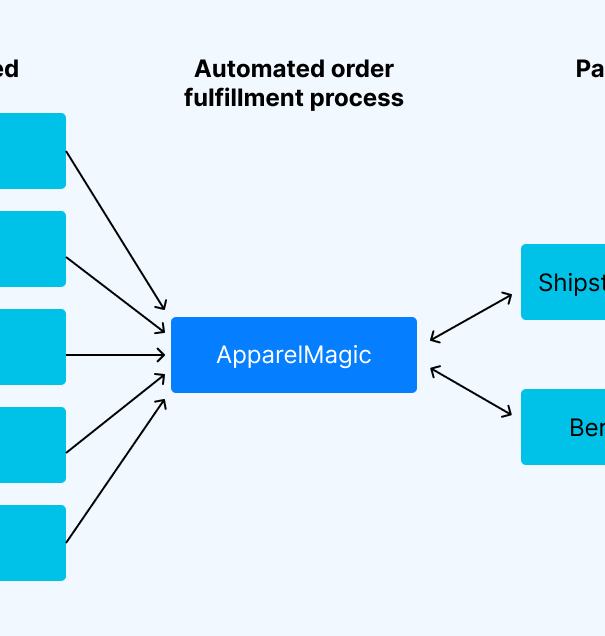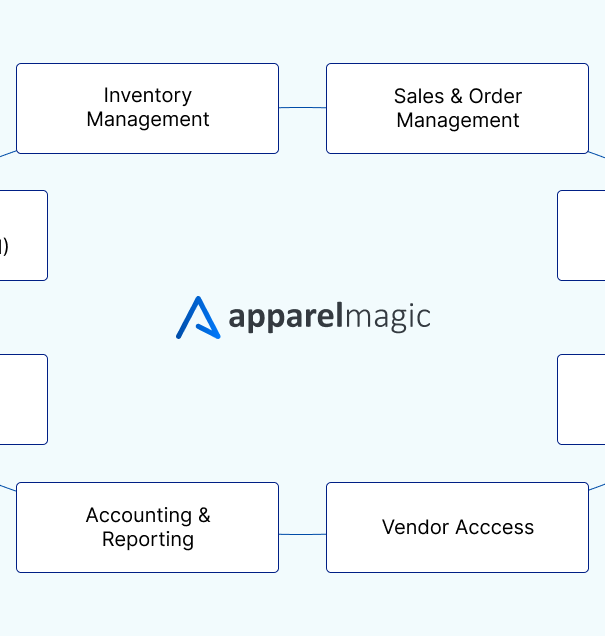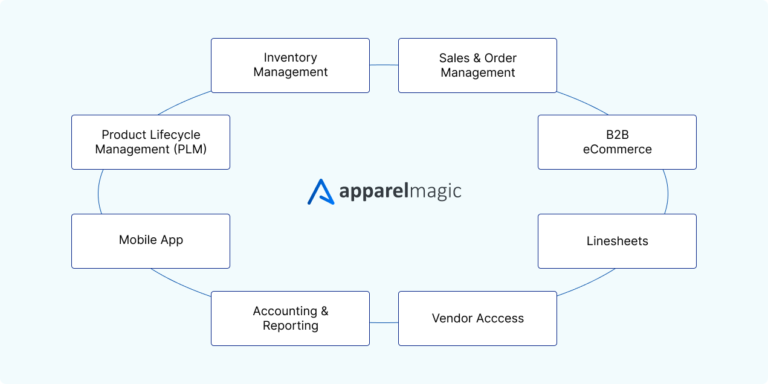Seeking to modernize and stay ahead in the fast-evolving apparel industry, many brands are turning to ERP solutions. This strategic shift is pivotal as it directly impacts production, inventory and data management.
Our focus here will dive into how adopting ERP in the apparel industry equips businesses to face 2024’s unique challenges and leverage upcoming ERP in the apparel industry for sustained growth and competitive advantage.
A brief overview of ERP and its significance in Apparel Brands
ERP, or enterprise resource planning, is a game-changer for the apparel industry. This specialized software helps businesses manage everything from inventory management and supply chain to production planning and back-office operations.
The fashion and apparel industry, including the apparel manufacturing business, is fast-paced, with trends shifting quickly. Apparel businesses require a robust system to manage inventory levels and keep abreast of the latest market trends, a role perfectly suited for apparel ERP software. Implementing apparel ERP systems can greatly enhance the efficiency and productivity of businesses in this dynamic fashion and apparel industry.
ERP also significantly aids in supply chain management for apparel businesses, particularly in the fashion supply chain. It provides real-time information about raw materials, production status, and shipment details, facilitating informed decisions and waste reduction.
Lastly, ERP simplifies back-office operations such as order and warehouse management. The automation of these processes via ERP allows businesses to devote more time to fashion creation and less to administrative tasks.
ERP Trends in 2024
Venturing further into 2024, we observe a few key trends in the ERP landscape, including a shift toward cloud-based solutions. More and more businesses are choosing to host their ERP systems on the cloud for better scalability, cost-effectiveness, and ease of use.
Another significant trend is the integration of AI and machine learning into ERP systems. This automation not only improves efficiency but also provides valuable insights that can help businesses make smarter decisions.
The importance of user experience and mobility is also on the rise. Today’s ERP systems are designed with the user in mind, offering intuitive interfaces and mobile access for working on the go. This not only improves productivity but also makes the system easier to adopt for new users.
Another emerging trend is the seamless integration with other systems. Whether it’s CRM, HRM, or other business systems, modern ERP solutions are designed to work seamlessly with them, creating a unified platform for managing all aspects of the business.
These trends are not just about technology, though. They also have significant implications for business growth. A well-implemented ERP system can accelerate growth by providing real-time data, improving decision-making, and streamlining operations.
And finally, let’s not forget about the importance of future-proofing. With the pace of technological change, businesses need an ERP system that can adapt and evolve. Choosing a system that is flexible and scalable is key to ensuring that your ERP investment is future-proof.
Impact of ERP Trends on Apparel Brands
The apparel industry, also known as the fashion industry, is experiencing profound changes due to these ERP trends. Take AI, for example. From design and apparel manufacturing to sales and customer service, AI is revolutionizing every stage of the apparel business, including the work of apparel manufacturers.
Apparel ERP software also plays an essential role in managing market trends in the apparel industry. By providing real-time data and insights, ERP helps businesses stay on top of the latest trends, anticipate customer demands, and make strategic decisions.
And of course, in the fashion industry, future-proofing holds particular importance. With trends changing rapidly, businesses need an ERP system that can keep up. Fashion ERP software is designed to adapt to changes, ensuring that businesses are always ready for the future.
Not only are these trends transforming business operations, but they’re also aiding in meeting consumer preferences. With AI, for instance, businesses can create personalized shopping experiences, predict trends, and even design clothes based on customer data.
Operational efficiency is also greatly enhanced by ERP. It automates repetitive tasks and streamlines business processes, allowing businesses to concentrate on fashion creation.
Whether it’s managing inventory, predicting trends, or streamlining operations, the impact of this apparel industry software cannot be overstated. And with the right apparel ERP system in place, apparel businesses are better equipped to navigate the exciting world of fashion.
Leveraging Data Analytics for Enhanced Customer Insights
In addition to the trends mentioned, another critical area where ERP is set to make a significant impact in the apparel industry in 2024 is through enhanced data analytics capabilities. With the vast amount of data generated by ERP systems, brands have an unprecedented opportunity to dive deeper into customer insights, preferences, and behavior patterns. This analysis can inform everything from product development to targeted marketing strategies, ensuring that brands not only meet but anticipate customer needs.
Data analytics powered by ERP can help apparel brands identify which products are performing well, which are lagging, and why. It can also provide insights into the most effective marketing channels, customer segmentation, and even optimal pricing strategies. By leveraging these insights, brands can tailor their offerings more closely to consumer demands, enhancing customer satisfaction and loyalty.
Moreover, predictive analytics, a subset of data analytics, can enable brands to forecast future trends, demand patterns, and even potential supply chain disruptions. This foresight allows for better inventory management, reducing the risk of overstock or stockouts, and ensuring that brands can react swiftly to changes in the market.
Incorporating data analytics into ERP systems provides a competitive edge by enabling more strategic decision-making and a more customer-centric approach. As the apparel industry continues to evolve, the brands that effectively harness the power of data will be those that stay ahead in the race to meet and exceed customer expectations.
Embracing Sustainability Through ERP Integration
Another vital dimension where ERP systems are set to redefine the apparel industry in 2024 is through the facilitation of sustainability practices. As consumers increasingly prioritize environmental and ethical considerations in their purchasing decisions, apparel brands are under growing pressure to demonstrate sustainability in their operations, supply chain, and product lifecycle. ERP systems are pivotal in achieving these sustainability goals by enabling more efficient resource management, waste reduction, and transparency throughout the supply chain.
By integrating sustainability metrics and compliance standards directly into ERP software, brands can monitor and manage their environmental impact more effectively. This includes tracking the use of sustainable materials, optimizing production processes to reduce waste, and ensuring fair labor practices across the supply chain. ERP can also aid in the management of product lifecycles, helping brands design products with longer lifespans and facilitate recycling or repurposing at the end of their life.
Furthermore, ERP systems can help apparel companies achieve greater transparency by providing detailed insights into every stage of the supply chain. This transparency is crucial for verifying sustainability claims and for building trust with increasingly skeptical consumers. It also enables brands to identify and address any sustainability issues more rapidly, such as reducing carbon emissions or eliminating hazardous materials from their production processes.
Incorporating sustainability into ERP systems not only helps apparel brands meet regulatory requirements and consumer expectations but also uncover efficiencies that can lead to cost savings and innovation. As the industry moves towards a more sustainable future, ERP systems will be instrumental in helping brands navigate this transition, turning environmental responsibility into a competitive advantage.
Key Takeaways
- Enterprise resource planning (ERP) is crucial for managing inventory, supply chain, production, and back office operations in the dynamic apparel industry, enhancing efficiency and productivity.
- ERP trends in 2024 emphasize cloud-based solutions, artificial intelligence (AI), machine learning integration, user-friendly and mobile interfaces, and seamless compatibility with other business systems for a more unified management platform.
- The impact of ERP on apparel brands includes using AI to revolutionize stages from design to customer service, providing real-time data for trend management, and improving operational efficiency for better adaptability to the fast-changing fashion industry.
Conclusion
ERP serves as a powerful tool, aiding apparel businesses in staying competitive. Whether it’s managing inventory, tracking market trends, or streamlining operations, ERP provides the tools and insights needed to succeed in the dynamic world of fashion.
As we look ahead, the importance of ERP in the apparel industry is expected to rise. With trends such as cloud computing, AI, and seamless integration shaping the future of ERP, businesses that embrace these technologies will be well-positioned to thrive.







